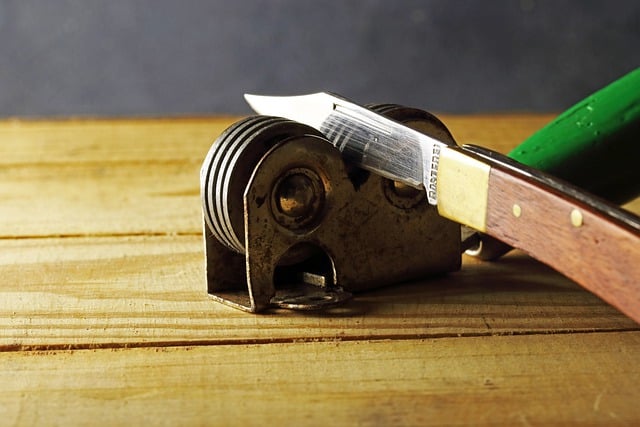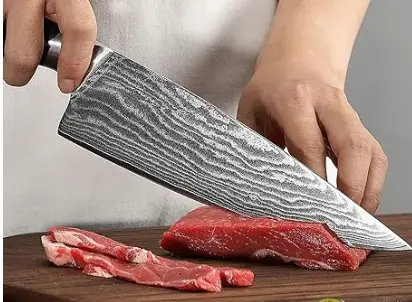What is FC61 Steel?
FC61 steel is a fine-grained martensitic stainless steel with carbon and chromium as its main elements. It is Henckels Proprietary name for Sandvik 13C26 Steel and is commonly used in Miyabi Kitchen knives.
When properly heat-treated and tempered, the steel makes tough, durable, and corrosion resistance blades. FC61 steel is also used to manufacture high-end knives in Seki, Japan. It is ideal for razor blades and surgical knives too.
FC61 Steel Composition (FC61 Steel Chart)
- Carbon C 0.68%: Increases edge retention, hardness, and tensile strength. It also improves steel resistance to wear, abrasion, and corrosion.
- Chromium Cr 13.00%: Formation of Chromium carbides. Increases the blade’s hardness, tensile strength, and corrosion resistance.
- Manganese Mn 0.70%: improves the strength and hardness of steel. When the steel is heat-treated, hardenability is improved with increased manganese.
- Silicon Si 0.4%: Increases strength and heat resistance.
- Sulfur S 0.01%: Improves machinability it is regarded as an impurity and may affect the performance of the steel.
- Phosphorous P 0.02%: Increases the strength and improves the machinability of steel but is regarded as an impurity.
Properties of FC61 steel
FC61 Steel Hardness
FC61 stainless steel exhibits a Rockwell hardness of up to 61HRC. The achieved hardness varies with the heat treatment technique and the tempering time of the manufacturer. High hardness positively influences properties like edge retention and wear resistance of the blade steel.
FC61 Steel Edge retention
With a Rockwell hardness of 61HRC, FC61 blade steel offers good edge retention though not the best out there, particularly in stainless steel. Its edge retention is enough to last several cuts but will need sharpening when constantly used.
FC61 Steel edge retention is lower than Japanese VG10 steel, also used in most kitchen knives but is at the same level as AUS 8 steel and 8Cr13MoV steel. It is, however, marginally better than German 1.4116 and X50CRMOV15 stainless steel.
FC61 Steel Wear resistance
With daily usage, knife blades are expected to wear and tear, and all types of steel blades bow to the effects of abrasion at some point. For that reason, it is essential to purchase a knife with excellent wear resistance properties, and FC61 knives fall into that category thanks to the high hardness.
Because of the high wear resistance, FC61 blades last for a long time, even with daily usage and frequent sharpening. To improve the lifespan of FC61 steel knives, you can stick to sharpening them with whetstones and avoiding automatic sharpeners.
FC61 Steel Toughness
The toughness of steel can sometimes be described as inversely proportional to its hardness. This means that steel with high hardness offers low toughness. FC61 stainless steel has a hardness of about 61 HRC; however, its toughness level is very high.
The high toughness can be attributed to the high purity of FC61 steel alloy composition, mainly composed of carbon and chromium with minimal impurities. This allows for the formation of fine-grained carbides, which significantly improves toughness and hardness at equal measure.
FC61 stainless steel toughness is better than most stainless steel; Its toughness level is equivalent/comparable to 14C28N steel, AEB-L steel, and LC200N steel. It beats VG10 blade steel, SG2 steel, and even powder Crucibles steels like S45VN and S30V.
FC61 Steel Corrosion resistance
FC61 steel is stainless steel with 13% chromium in its composition, and therefore, it does not rust or stain easily. If you are shopping for a knife in corrosive environments like in the kitchen or areas of high humidity and salty water, FC61 stainless steel knives will not disappoint.
Although the steel is resistant to rust, it can still rust if exposed to corrosive situations. For instance, you cannot leave the blades in water overnight and expect them not to rust. This calls for proper care and maintenance, which involves washing, cleaning, and drying the knives after use. Apply a coat of mineral oil on the blades and remove the sheath for long-term storage for extra protection.
FC61 steel corrosion resistance is comparable to Japanese AUS 8 steel, Nitro V steel, and CPM 154 stainless steel.
Ease of sharpening FC61 Steel
The ease of sharpening a knife blade is directly affected by its hardness. Therefore hard steels like FC61 are challenging to sharpen. Note that this does not mean that the blades will never take a sharp edge after dulling, but it will take you more time and energy to get a sharp edge.
An easier way to get a sharp edge with this steel is to use whetstones. You need to go through the different grades of whetstones for a sharper edge. You can start with a 400 grit to a 1000 grit to a 4000 grit until you get your desired sharpness.
FC61 steel comparison
FC61 steel vs VG10 steel
The main difference between FC61 Steel and VG10 steel is that FC61 steel offers twice the toughness of VG10 blade steel due to its pure alloy composition that greatly improves its toughness over most stainless and non-stainless steel. FC61 blade steel is less likely to break or chip when used on tougher things like cutting bones.
Both FC61 and VG10 knife steels offer good edge retention. However, VG10 steel contains higher amounts of carbon and has vanadium elements in its alloy composition, thus offering higher hardness, edge retention, and wear resistance due to the formation of hard vanadium carbides.
Both FC61 and VG10 are stainless steels; however, Japanese VG10 steel contains a higher amount of chromium elements in its alloy composition hence offering slightly better corrosion resistance.
FC61 steel vs SG2 (FC61 vs MC63)
Henckels uses SG2 Steel under its proprietary name MC63 steel, just like it uses Sandvik 13C26 Steel under its proprietary name FC61 steel. The main difference between FC61 steel and SG2 (Super Gold 2) steel is that FC61 Stainless Steel offers twice the toughness levels of SG2 stainless steel. SG2 stainless steel, on the contrary, offers better edge retention and corrosion compared to FC61 steel.
The high toughness achieved by FC61 Steel is due to its highly pure alloy composition, which lacks other elements like vanadium and has very few impurities in the form of phosphorus or sulfur. The highly pure chemical composition allows the grain of FC61 steel to be extremely fine and thus have better toughness.
SG2 steel, on the other hand, offers better edge retention due to its alloy composition containing high carbon percentage and other elements like vanadium which are responsible for the formation of hard vanadium carbides that are excellent when it comes to edge retention.
SG2 stainless steel also offers slightly better corrosion resistance due to a high amount of chromium elements in its alloy composition than FC61 steel. The difference in corrosion resistance between these two blade steels is not noticeable in daily application.
Is FC61 good knife steel?
FC61 stainless steel has all the properties of good knife steel. It offers excellent toughness, corrosion resistance, and wear resistance. The only downside of this steel is that it does not hold an edge for as long as other stainless steel offering similar hardness, and its high hardness makes it challenging to sharpen.
Check out this Miyabi 6.5-inch FC61 steel Nakiri knife. Something that makes it stand out from the crowd is the heat treatment techniques used on it. It achieves 61HRC and maintains an exceptionally thin blade close to Usuba level. Check Current Prices for FC61 steel knives on Amazon.




